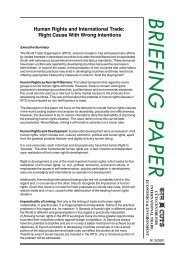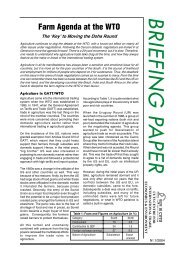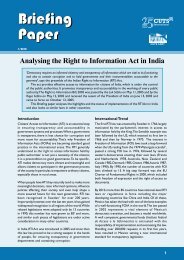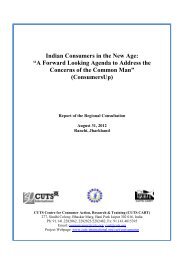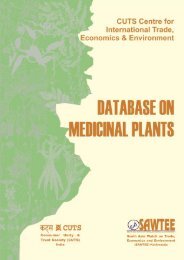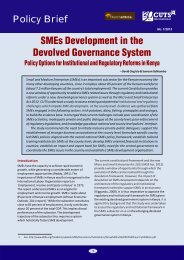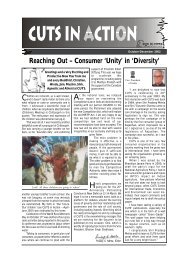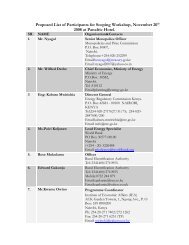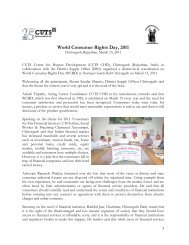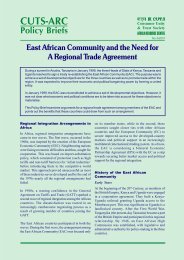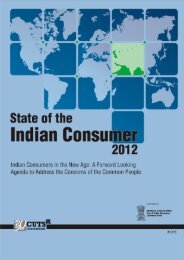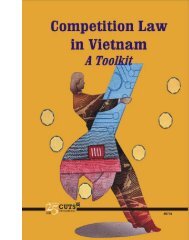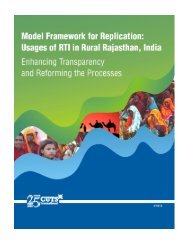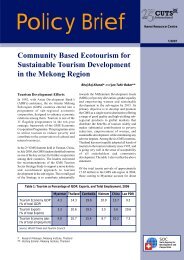Final Report - World Trade Organization
Final Report - World Trade Organization
Final Report - World Trade Organization
Create successful ePaper yourself
Turn your PDF publications into a flip-book with our unique Google optimized e-Paper software.
The conflicts between sector specific regulators and<br />
competition authorities are more common. In<br />
Pakistan, for example, regulatory authorities for<br />
several utilities (telecom, natural gas, power etc.)<br />
have been set up. These authorities work<br />
independently. They may seek advice from the<br />
competition authority but are not legally bound to do<br />
so. The situation appears to be similar in Kenya and<br />
Sri Lanka.<br />
The case of Tanzania is interesting as the sector<br />
specific regulation was initially under the purview of<br />
the competition authority. Subsequently, some sector<br />
specific regulatory authorities were created. The<br />
conflicts between competition authority and Tanzania<br />
Communication Commission (TCC) became obvious<br />
when the former filed a complaint against the latter<br />
for permitting dominance of two cell phone<br />
companies (Mobile and Tritel) in the country. The<br />
TCC subsequently permitted other cell phone<br />
providers e.g. Vodafone to provide service in the<br />
country.<br />
The government is now creating two multi-sector<br />
regulatory agencies: one to regulate utilities<br />
(electricity, telecom, electronic broadcasting, natural<br />
gas and postal services) and the other to regulate<br />
the transport sector. The new legislation is expected<br />
to provide clear guidelines regarding the division of<br />
responsibilities between the competition authority and<br />
the sector specific regulators. Apparently, the<br />
Competition Tribunal will also act as the final<br />
appellate body for the multi-sector regulatory<br />
agencies. Thus, Tanzania seems to have recognised<br />
the potential overlaps between sector specific<br />
regulation and competition law. However, it is not<br />
entirely clear how the harmonisation of competition<br />
policy within the East African Community will affect<br />
the division of labour envisaged by them. 202<br />
The situation in South Africa is somewhat different,<br />
as they have ‘privatised’ utilities and infrastructure<br />
services through ‘strategic equity partners’ who bring<br />
in technical and management expertise along with<br />
capital. In some cases, limited time monopoly<br />
(telecom, fixed line) has been provided. The fixed<br />
line operator can also provide value-added services<br />
and compete with private operators. Since the fixed<br />
line operator owns the network, private operators<br />
providing value added services have often complained<br />
about access to the network. Along with these<br />
privatisation efforts, sector specific regulatory<br />
authorities have also been set up in South Africa.<br />
For example, matters relating to telecom are now<br />
covered by the Independent Communications<br />
Authority of South Africa (ICASA).<br />
The problems faced in Tanzania and South Africa<br />
can arise in other countries as well. Since the sector<br />
specific regulatory bodies are often responsible for<br />
defining ‘entry conditions’, their actions directly affect<br />
the nature of competition after entry has taken place.<br />
Consequently, the conflicts between sector specific<br />
regulators and competition authorities are expected<br />
to arise.<br />
There are no clear solutions to this problem but an<br />
explicit recognition of the issue is a good starting point.<br />
One can then work towards a remedy. The South<br />
African example is very instructive in this regard.<br />
The South African government recognises the fact<br />
that the overlapping jurisdictions between competition<br />
authorities and regulatory bodies will create problems,<br />
as firms will take their cases to the forum they believe<br />
to be most favourable. Therefore, it is stipulated that<br />
the Competition Act will not apply to ‘acts subject to<br />
or authorized by public regulation’. But firms used<br />
this provision to argue in the High Court that the<br />
Competition Act did not apply to the agricultural and<br />
banking sectors, as there are a series of other acts<br />
regulating the practices of these sectors. 203 As a<br />
result, the stipulation was removed from the Act.<br />
The South African Competition Act provides for<br />
consultations to avoid situations of conflict between<br />
competition authority and regulatory agencies. A<br />
Regulator’s Forum is being established to implement<br />
this provision. Under this provision, the Commission<br />
is responsible to ‘negotiate agreements with any<br />
regulatory authority to coordinate and harmonize the<br />
exercise of jurisdiction over competition matters<br />
within the relevant industry or sector’. It seems that<br />
202 The Tanzania paper also gives the impression that the East African Community may also harmonise sector specific regulation.<br />
203 Interestingly, in the case of a proposed merger between two of the four national retail banks, the courts ruled that jurisdiction lay with<br />
the Minister of Finance. The Competition Tribunal, therefore, could not decide on the merger. The Competition Commission<br />
prepared a report for the Minister of Finance opposing the merger on grounds of likely reduction in competition. The Minister<br />
followed the Commission’s advice and disallowed the merger.<br />
62 w Pulling Up Our Socks



